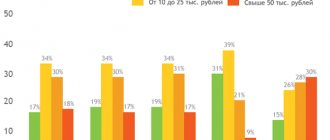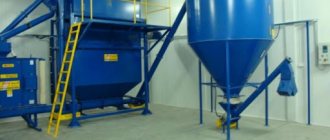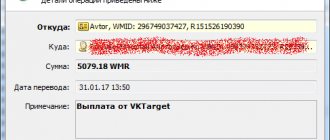For many, starting a business selling bread and baked goods seems simple and straightforward. Well, some people think - they set up a kiosk, made an agreement with the bakery, hired a salesperson and the deal is in the bag. In practice, everything may not be so rosy and simple...
Let's start with competition. There is no doubt that the market for bread and bakery products is oversaturated. In every city, at almost every stop, there is a point selling bread and pastries. In addition, any more or less large food market has its own mini-bakery - that’s who takes the main piece of the “pie” in this market. But that's not all. Bakery enterprises increasingly began to develop their own retail chains for the sale of bread and baked goods. And here you are definitely not their competitors if you are going to purchase products from these enterprises.
In short, don't expect an easy start. To gain the trust of a client and lure him away from a competitor, you need to try very hard.
Opening a business should be preceded by competent marketing research, analysis of closest competitors, analysis of their assortment and price level.
At the same time, at the start of the business, it is important not to miss the point. A successful location of a bread kiosk is almost 50% of the success of the entire business. Traditionally, the following are considered lively from a trading point of view:
- Public transport stops. People return home and buy bread;
- Large residential areas of the city. Here the kiosk operates on the principle of “bread within walking distance.”
- Markets (clothing and food). Here the kiosk receives income due to high traffic.
How much money does it take to open a bread kiosk?
Let's move on - investments. It’s definitely not possible to open with 50 thousand rubles. Start planning investments in your business with at least 250 thousand rubles. Anyway, let's do the math:
- Purchase of a trade kiosk - from 150,000 rubles;
- Decoration of a trade kiosk (advertising board, interior decoration, etc.) - from 40,00 rubles;
- Organizational expenses: costs for obtaining a land plot, registering a business, etc. - from 30,000 rubles;
- Creation of an assortment of goods - from 30,000 rubles;
- Other expenses - from 20,000 rubles.
TOTAL - from 270 thousand rubles.
What can you save on? Firstly, you can buy a used kiosk or pavilion.
Of course, a lot depends on the region and the condition of the object. Some entrepreneurs generally advise renting a kiosk for the first time, which is called “swallowing all the delights of business.” And then invest in the business to the fullest.
And secondly, you can save on purchasing goods by purchasing them for sale from local bakeries. Here's how you agree.
Flour with flour
At Sasha’s Bakery, they principally work only with whole grain flour, since it retains fiber, vitamins, proteins, and fats in the required quantities.
– White flour of the highest quality is not the best, as is commonly believed, but the most carefully processed. But during this processing, it loses many useful properties. There are a lot of scary stories: for example, that such flour is even bleached with bleach. Now we buy raw materials only from a trusted farmer from the Penza region, who is guaranteed not to use chemicals, fertilizers, or growth accelerators. And this bread has a different taste, not to mention its properties,” says Sasha.
Sasha’s Bakery doesn’t even use the usual yeast; it is replaced by sourdough made from flour and water. Such useful “bricks” are, of course, not cheap: from 120 rubles per loaf. But the loaf, the baker notes, is 450 grams instead of the usual 250–300 grams for analogues.
There is bread with seeds, and there is bread with dried apricots. But, Sasha says, she doesn’t have any secret recipes.
“It’s just an honest product that doesn’t have any hidden ingredients,” says the St. Petersburg baker’s main advantage.
Her opinion is shared by regular customers who specially come to the mini-bakery and immediately buy several buns for the week ahead. Even by the end of the week, such bread does not become moldy: it becomes drier, but does not lose its taste.
Sasha’s hobby (on the right) has grown into a business // Photo: from personal archive
– The main advertising in our case is word of mouth. We created a VKontakte group, added a dozen friends to it, and then the number began to grow on its own. We didn’t do any mailings or promotions, but today we already have almost 3,000 people,” shares Alexandra.
Now there are 100–200 rolls per day. But this business does not plan to grow by leaps and bounds.
“We definitely don’t want to become industrialists,” Neyland is categorical. “We have a handcrafted product, that’s why it’s valuable.” But we are thinking about opening more small bakeries in the future and teaching people this business at our craft school. Maybe over time we’ll buy a field and grow grain ourselves for our own purposes. There are already requests for our franchise.
The idea of healthy bread was appreciated by many. And someone supported with a ruble.
– We thought, of course, about investors who would help us at first. But they weren't looking for anyone. Investors found us themselves. These are our old friends with whom we recently met, got to talking, and they were so impressed that they volunteered to invest in our business. Our future companions turned out to be the same enthusiasts as we are,” Alexandra shared.
The business is still too young. But you can count on profitability in just a few months.
– 50% minimum. But I think 100% is quite realistic,” the businesswoman estimates.
Enough for bread and butter. And not only.
Bread kiosk assortment
Next is the range. You definitely can’t survive on bread alone, since the markup on it is strictly controlled by local officials (an essential commodity). Therefore, it cannot be more than 10-15%. And it makes no sense to mark up the price anymore, since they won’t take expensive bread from you. It’s better to go to the next point. In general, bread serves as a “bait”, and they make money by selling related products: bakery products, confectionery, groceries, cakes, etc. The markup on such goods can reach 50 percent or more. \
Some difficulties may arise with obtaining a plot of land for installing a kiosk. Administrations will not always welcome you with open arms (although now they talk a lot about supporting small businesses). The main thing here is persistence and perseverance in conversations with officials. If something goes wrong at the local level (your rights are being violated), contact the regional administration, write letters.
One of the last stages of organizing a business is finding sellers. And this path is not “strewn with roses.” For any business related to sales, it is very important to have a competent, efficient, polite, and most importantly, experienced salesperson. Due to the fact that the profitability of the bread selling business is not very high (the average profit of a bread kiosk is 2,000 - 4,000 rubles per day), you will not be able to offer high wages to job seekers. This means that not every experienced salesperson will rush to get a job with you.
However, if you have good reserve capital to pay high wages while promoting your business, you can find an “expensive” employee and pay him 30 thousand rubles a month. This way you can quickly achieve self-sufficiency in your business. A cheaper option is to find sellers with no experience and, through trial, error and regular layoffs, select a good team. Or, as a last resort, trade for the first time personally with the project initiator.
How to open a bakery and what is needed for this?
To open a mini bakery, follow the following procedure:
- Make a business plan. You can take a ready-made example with calculations and, based on it, enter the necessary information.
- Analyze the market. It often differs from national trends. Determine what is interesting to consumers living in your city.
- Work through your competitors, study their range. If most businesses sell bread, bake cookies or cakes. Go for a niche that is less crowded but still popular. After completing a business plan, you will read the approximate costs and determine the possible level of income.
- Choose a form of doing business, and then collect a package of documents. Permission from the SES, fire inspection, Rosstandart and a number of other authorities will be required.
- Find a room and rent it. At the first stage, purchasing real estate is not practical. The acquisition will require a lot of funds that can be spent on business development. Select a room that meets the established requirements.
- Purchase equipment. The list depends on the production cycle. Buy quality kitchen equipment.
- Hire staff and develop an assortment. The number of employees depends on the volume of production. If you have the relevant skills, get started on your own. Subsequently, find additional personnel. Make sure all employees have the necessary documents.
- Find partners and start promoting your business. Allocate money monthly for advertising. The profitability of an organization depends on competent promotion.
Legal issues and required documents
To make your mini-bakery work, register your organization. To do this, create an individual entrepreneur or open an LLC. If there is only one owner, registration as an individual entrepreneur is suitable. Various benefits are available to him. Reporting is prepared in a simplified form. As a tax regime, select the simplified tax system at a rate of 15%. The UTII system is not available for companies that are not considered catering establishments. To register as an entrepreneur, prepare the following documents:
- completed application;
- identification;
- a document confirming payment of the state duty;
- TIN.
If you are creating a large company, register an LLC. To do this, prepare the following documents:
- constituent documentation;
- real estate papers;
- an employment contract concluded with the director.
Then you will need to select OKVED codes. The following are suitable for operating a mini-bakery:
- 10.7 - production of bread and flour confectionery products;
- 47.24 - retail trade in bread and bakery products in specialized stores;
- 47.25.2 - retail trade in non-alcoholic drinks;
- 47.29.35 - retail trade in tea, coffee, cocoa.
The last 2 codes are used if the mini-bakery additionally provides cafe services. In order for the organization to begin work, collect permits. Required:
- Permit for production and products. The document is provided by Rospotrebnadzor after an examination.
- Certificate of conformity.
- Permission from Rospozharnadzor.
- Permitting documentation for equipment.
- Conclusion of the SES.
- Agreements with service organizations.
Please note that the Ministry of Emergency Situations, Rospozharnadzor and Rospotrebnadzor carefully check new organizations. Their representatives conduct examinations. They get acquainted with the documents, study the availability of sanitary books, the compliance of equipment, and get acquainted with the disinfection register.
The Ministry of Emergency Situations and the fire service will make sure that the company has fire warning systems installed, fire extinguishing equipment is present, and the materials comply with established standards. Additionally, they will check the conduct of training among staff.
Requirements and selection of premises
If you are creating a mini bakery, provide for the possibility of retail sales. Wholesale buyers purchase products at discounted prices. For small-scale businesses, this is not always acceptable.
Think about the location of the mini-bakery. When choosing an area, consider:
- Patency. The more people on the street, the better for business. The advantage will be the presence of nearby places where customers gather.
- Condition of the building. Give preference to good premises. Otherwise, you will spend additional money on repairing the building.
- Availability of access roads and public transport stops. Profits are higher for mini-bakeries located near metro stations and stops.
- Saving on rent. Representatives of small businesses can participate in government support programs. Benefits apply to rental premises.
By law, it is prohibited to open mini-bakeries in private homes. If the output of bakery products does not exceed 1000 kg per day, the company can be located in extensions to residential buildings. The rule applies if there is complete autonomy of engineering communications. Rent a room with an area of at least 100 sq.m. and place on it:
- manufacturing facility;
- warehouses;
- locker room, bathrooms;
- staff room;
- administrative premises;
- shopping room.
In order for the company to be allowed to begin work at the inspection stage, follow the sanitary requirements:
- hygienic certificates are required for finishing materials;
- bakery products cannot be produced in basements or on the ground floor;
- Only smooth floors and walls are allowed. The presence of cracks is prohibited;
- Specialized mats soaked in disinfectants are placed in front of the doors leading to the workshop;
- raw materials and finished products cannot be stored together with household, strong-smelling or disinfectants. Organize separate warehouses;
- The warehouse must have good ventilation and heating. An unacceptable temperature decrease of less than 8 degrees Celsius, and an increase in humidity to 75%;
- The intersection of production flows of raw materials and finished products is prohibited.
Cover the floors and ceiling with a material that can withstand regular wet cleaning. Mini bakeries are considered to be at increased risk of fire or explosion. The State Fire Supervision Service keeps such organizations under strict control. Observe the following requirements:
- install a fire alarm and equip the premises with fire extinguishers;
- create an additional exit and do not clutter it;
- Separate rooms belonging to different fire hazard categories with fire-resistant partitions and doors;
- use only explosion-proof lighting fixtures;
- regularly measure the insulation resistance of electrical wiring;
- place signs indicating the fire hazard of warehouses and workshops. Information is posted on the doors.
Selection of equipment for the production of bread and pastries
To make your mini-bakery profitable, purchase equipment. It is divided into 2 categories - basic and additional. The first includes:
- ovens;
- dough mixing and dough sheeting machines;
- refrigerators;
- flour sifters;
- proofing cabinets.
Additional equipment depends on the specifics of the business. Usually needed:
- washing and packaging machines;
- scales and knives;
- storage shelves and shapes.
The list is not exhaustive. Immediately select the main type of dough from which you will make products. It can be puff, yeast, biscuit. The direction of the equipment depends on the type of test.
Hiring employees
Hire staff. To produce up to 1000 kg of products per day you will need:
- technologist and two bakers;
- loader and driver, if you have your own transport;
- cleaner and packer;
- accountant.
Finding bakers is difficult. The work of a specialist is poorly paid. At the same time, bakers perform difficult tasks. All employees must have medical records. Check this fact before hiring staff.
Business opening technology
The first thing to do to open a stall is to find a place that suits best and can be used for the activity. Next, a stall is purchased (you can make a retail outlet yourself), all permits are drawn up, contracts are concluded for the supply of bread and garbage removal. When everything is ready, you can start purchasing equipment, installing it and launching the stall.
( 6 ratings, average: 3.00 out of 5)
Loading…
Similar business ideas:
- TOP 30 business ideas without investment
- TOP 30 business ideas with minimal investment
- 21 working business ideas on how to make money on...
- Chatbot marketing: is it possible to get a good income...











